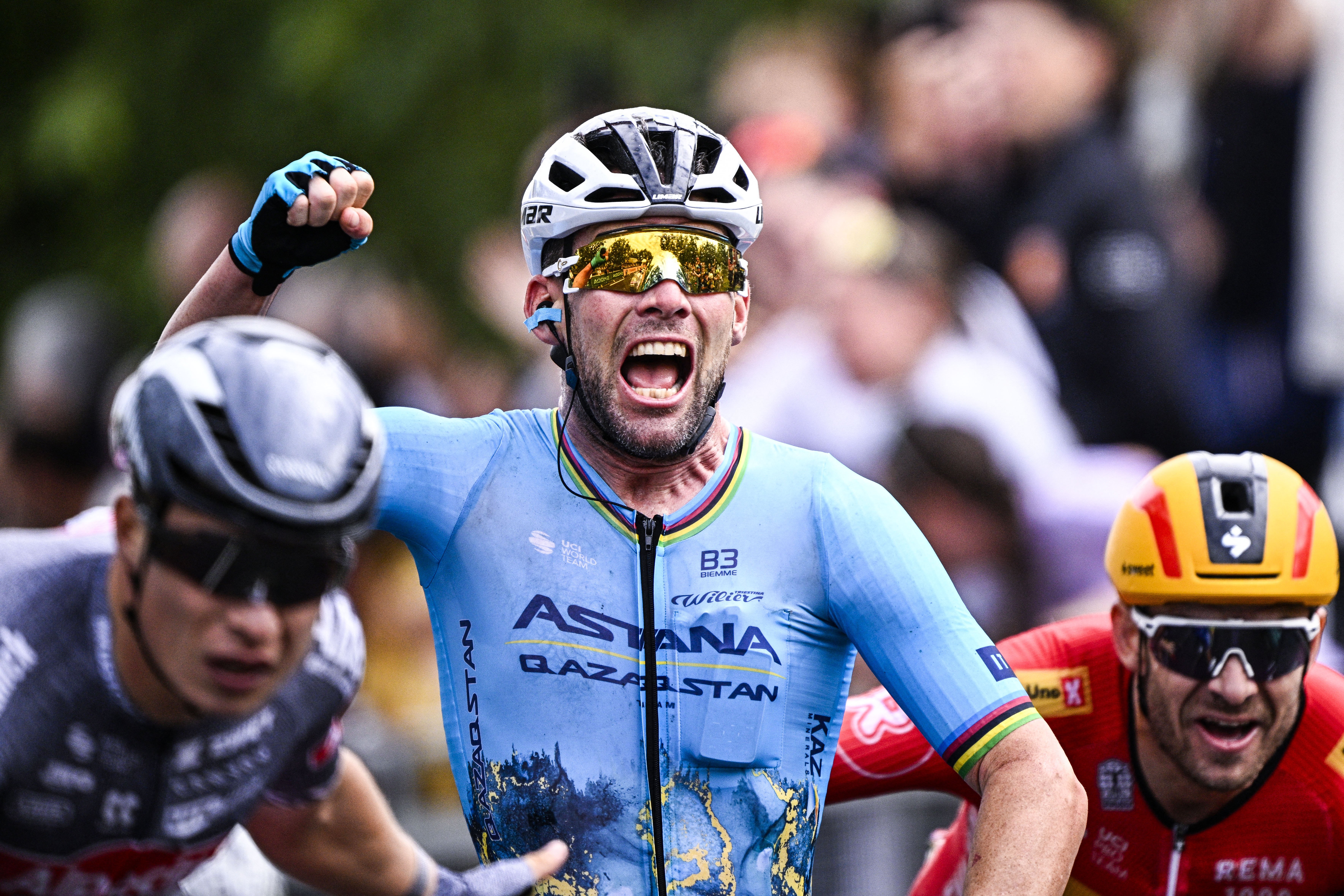
The curtain finally came down on Mark Cavendish’s record-breaking and era-defining career earlier this month at the Tour de France Singapore Criterium.
Whether Cavendish was the strongest rider on the day or his fellow professionals taking to the start in Asia opted to hand him the win at the event as a mark of respect is beside the point. It allowed us to appreciate the Manxman’s infectious grin, so often seen as he triumphantly raised his arms throughout his career, one last time.
More accurately, we witnessed the Douglas-born sprinter lift his arms in victory 165 times across his career, with his final professional win, a 35th Tour de France stage, likely to be the one that will live longest in the sport’s history.
The numbers are unfathomable. Across 20 seasons and with eight different teams, Cavendish was ravenous in his approach to success.
His 165 career wins include 58 Grand Tour stage wins, a record-eclipsing 35 of those at the Tour de France, as well as singular victories at the World Road Championships and the Monument Classic Milan-San Remo, alongside two National Championships titles.
However, to an outsider, that brief rundown of the 39-year-old’s palmarès depicts a career, so vast was it in the number of victories, that it must've been free from injury, illness or struggles. Of course, that couldn’t be further from the truth and is part of the reason that the Manxman Missile is seen as one of the greatest cyclists to grace the sport.
Bursting onto the scene
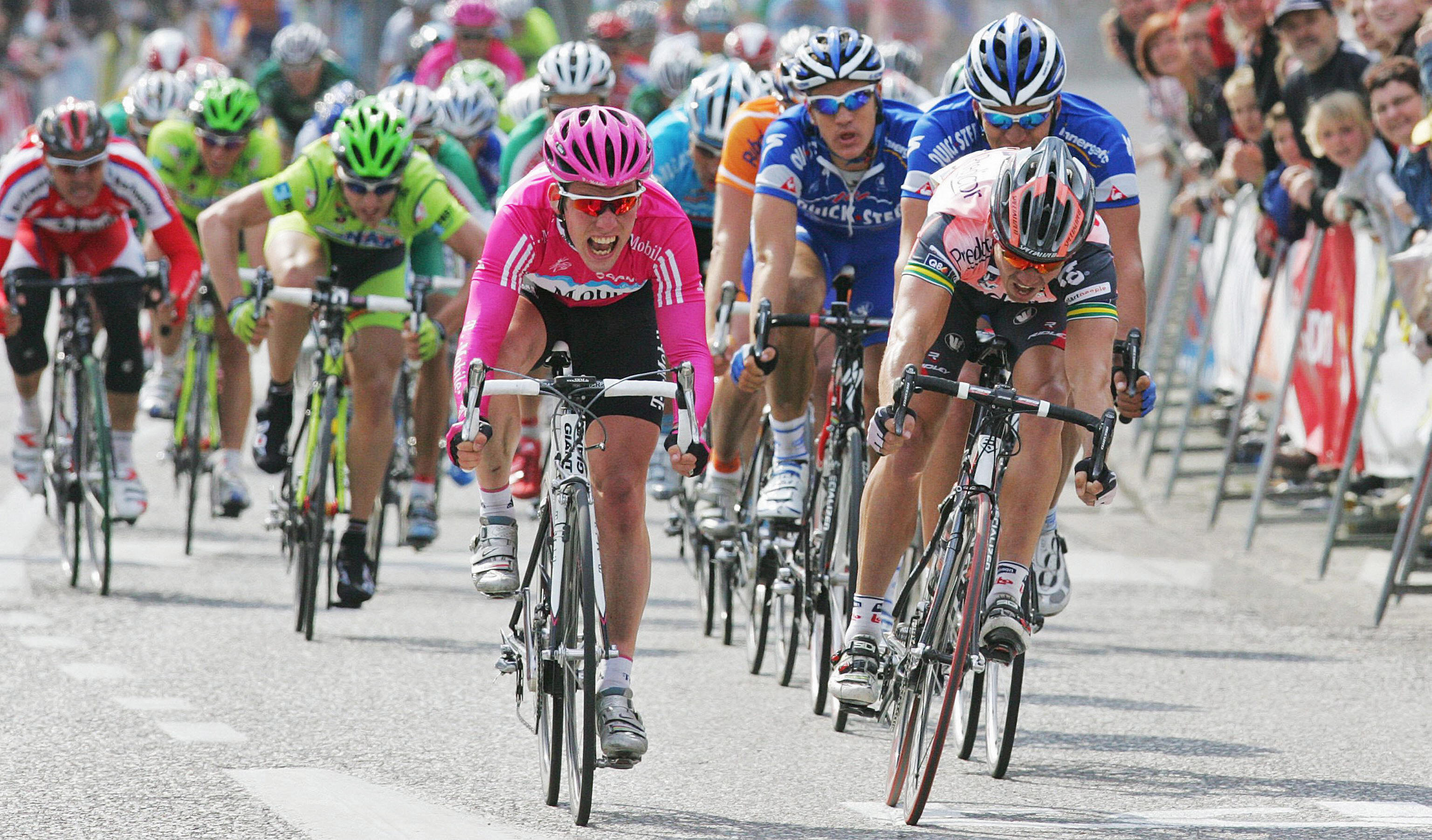
Cavendish’s professional career may have begun as early as 2005 but it was in 2007 that he notched his first major victory. The 21-year-old from the Isle of Man, resplendent in T-Mobile’s pink strip, came around the outside of the bunch at Scheldeprijs to lunge past three-time green jersey winner Robbie McEwen. Speaking after the race, Cavendish noted the significance of claiming his first big pro win at the expense of McEwen, stating: "I grew up respecting Robbie, and I just hope I can be the next Robbie McEwen."
Just over a year later, on the Calabrian coast, Cavendish, now with Team High Road, would take his first Grand Tour stage win on the fourth day of the 2008 Giro d’Italia. Cavendish described it as the “biggest win” of his career so far, having come from a long way back in the final kilometre before darting past Italian quickman Daniele Bennati in the closing stages. The British rider was already showing glimpses of that unfiltered confidence so often seen in the world’s best athletes when he boldly claimed: "Bennati went at the right moment but I beat him because I'm younger and I'm quicker in the final 100 metres of sprints."
Proving it at the Giro is one thing, but the Tour de France is a whole different beast. Yet Cavendish breezed to his first Tour de France stage in the sleepy town of Châteauroux on stage five. A town he would go on to become synonymous with.
"Oh my god," Cavendish screamed as he came to a stop after the finish line, swarmed by TV crews. "The only thing that mattered was a win in the Tour de France," admitted the sprinter in his winner’s interview.
‘More than just a sprinter’ and the Champs Élysées
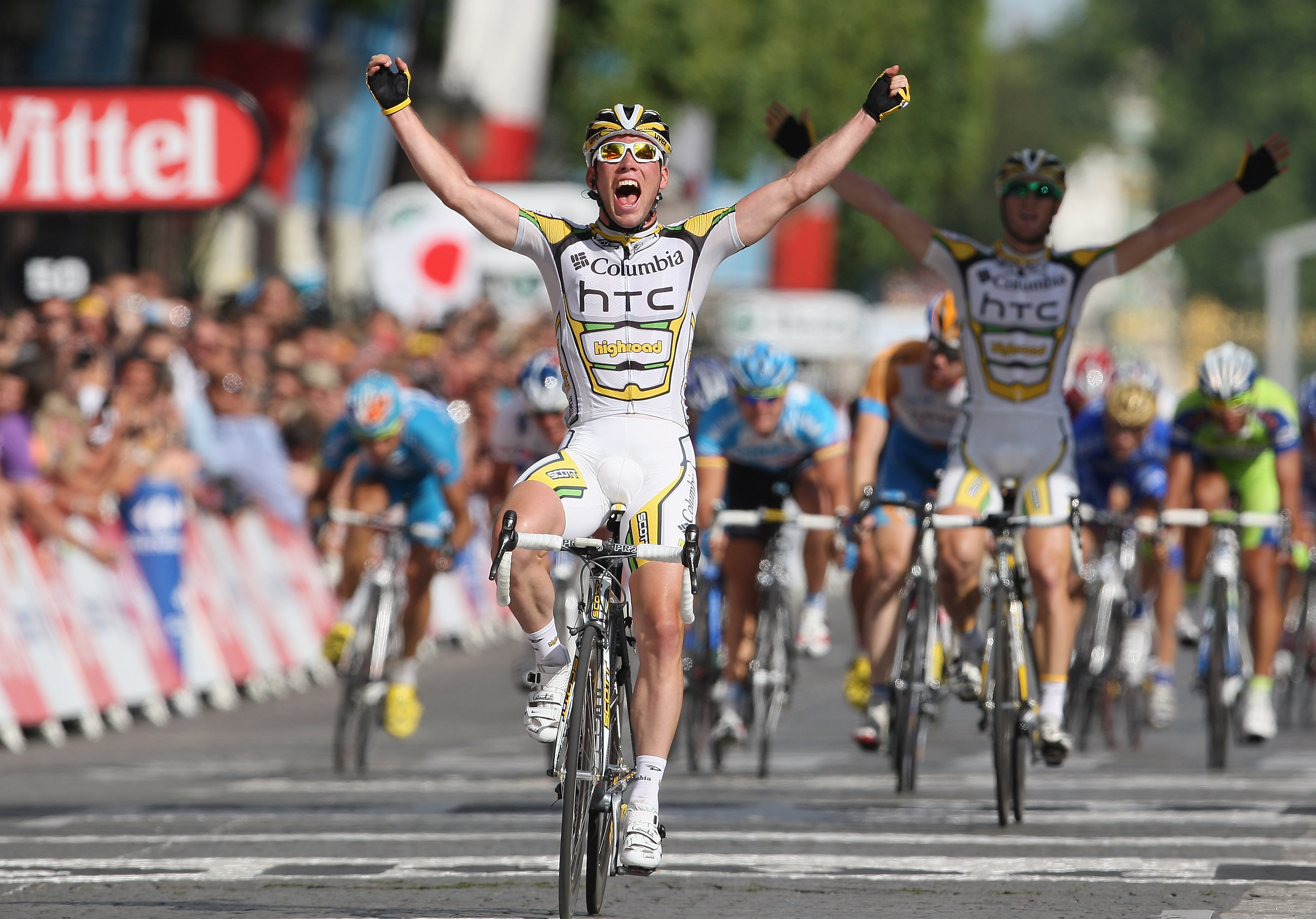
A year on from his first Grand Tour stage wins at the Giro and Tour, Cavendish was back in Italy adding another honour to his now rapidly expanding palmarès. He overcame the 298km distance of Milan-San Remo with still enough power left in his legs to pip Heinrich Haussler on the line for his first - and what would be his only - Monument title. Not only did he emulate what Tom Simpson had done at Milan-San Remo 45 years before him but he became the second-ever British Monument winner that day.
On the 100th edition of La Primavera Cavendish, helped by his entire Columbia-Highroad squad, stunned the field. “I wanted to prove I am more than just a sprinter, but a great rider – that is what I did today,” he explained at the finish.
This feat acted as the perfect lead-out for the Manxman’s 2009 summer season as he went on to claim three more sprint wins and the opening team time trial at the Giro before claiming six stages at the Tour de France two months later, and his first on the Champs Élysées as Mark Renshaw helped deliver a famous 1-2 finish. "This is Mark Renshaw, the fastest lead-out man in the business, and there's the missile, he's locked onto his wheel now," said commentator Phil Liggett as the race swept onto cycling’s most iconic finishing straight, before the youngster promptly romped home to the line with no one even in the same shot. "This is going to be a formality," added Liggett. "Win number six for Mark Cavendish. There's nobody that can match the speed of this amazing kid."
A first green jersey
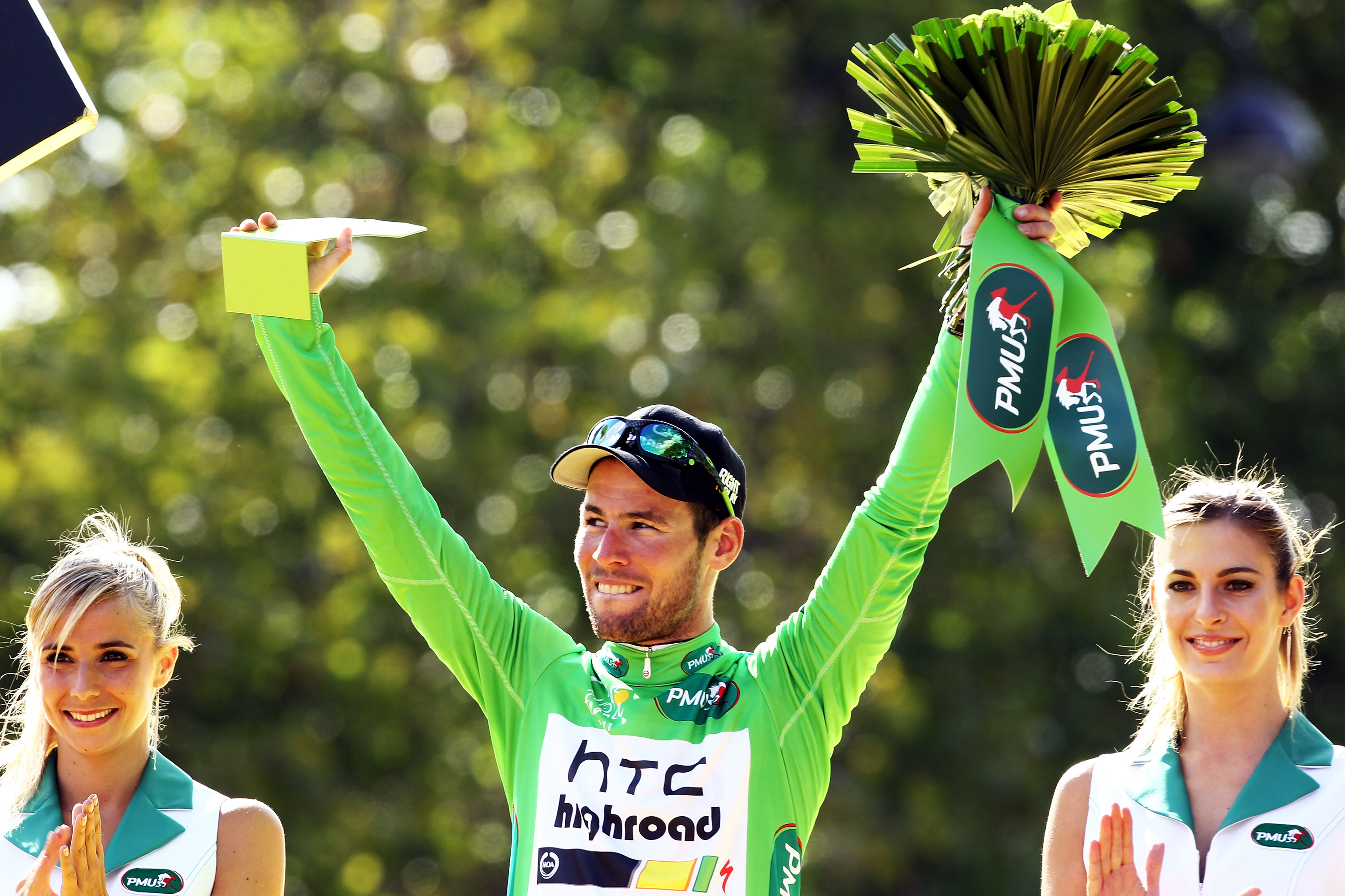
Two years and nine Tour stage wins later, Cavendish was back in Paris searching for another stage win to add collection, and more importantly, secure a first green jersey at La Grande Boucle.
As Cadel Evans sealed overall victory on the cobbled streets of the French capital, Cavendish comfortably took a third straight final stage win on the famous boulevard - securing the maillot vert in the process. “I’ve been trying to get this [the green jersey] for the past few years and finally I’ve done it,” Cavendish told Cyclingnews at the finish line, delighted to tick off another target.
He would make it four straight Champs Élysées victories a year later, two more than any other rider to grace the sport. That last win in Paris came as part of the all-conquering British Team Sky project, with his teammate and close friend Bradley Wiggins winning Britain's first-ever yellow jersey on the same squad.
Wiggins, who Cavendish has often described as a brother, went on to lead out Cavendish into Paris famously while donning the maillot jaune. Winning the Tour de France as a team is something Cavendish often describes as a huge career highlight.
On top of the World
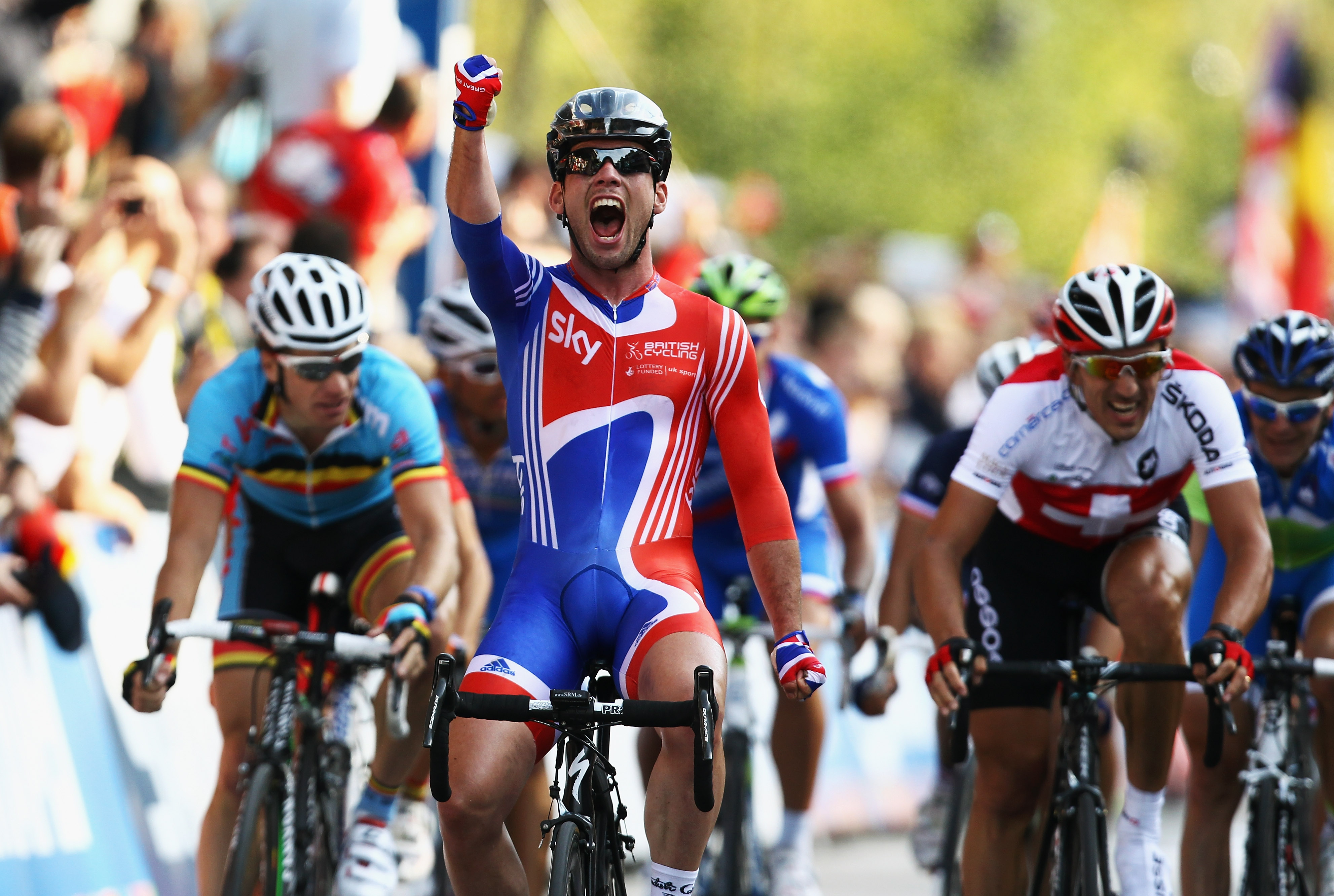
Later that same season, Cavendish would come from nowhere to take the rainbow jersey at the 2011 UCI World Championships road race in Copenhagen, Denmark
Once the Manxman hit the front, no one could match his sheer speed as he became the first Brit since Tom Simpson in 1965 to win the men’s road race title.
Speaking after the race, Cavendish paid tribute to the British squad, who all played their part in delivering him to the finish. "We put a plan together to come with the best group of guys to this race and to come away from it with the rainbow jersey. It's been three years in the making. The guys have worked so hard throughout the season to get points so that we could have eight riders here and, as you just saw, they rode incredibly. I feel so, so proud."
No fairytale homecoming
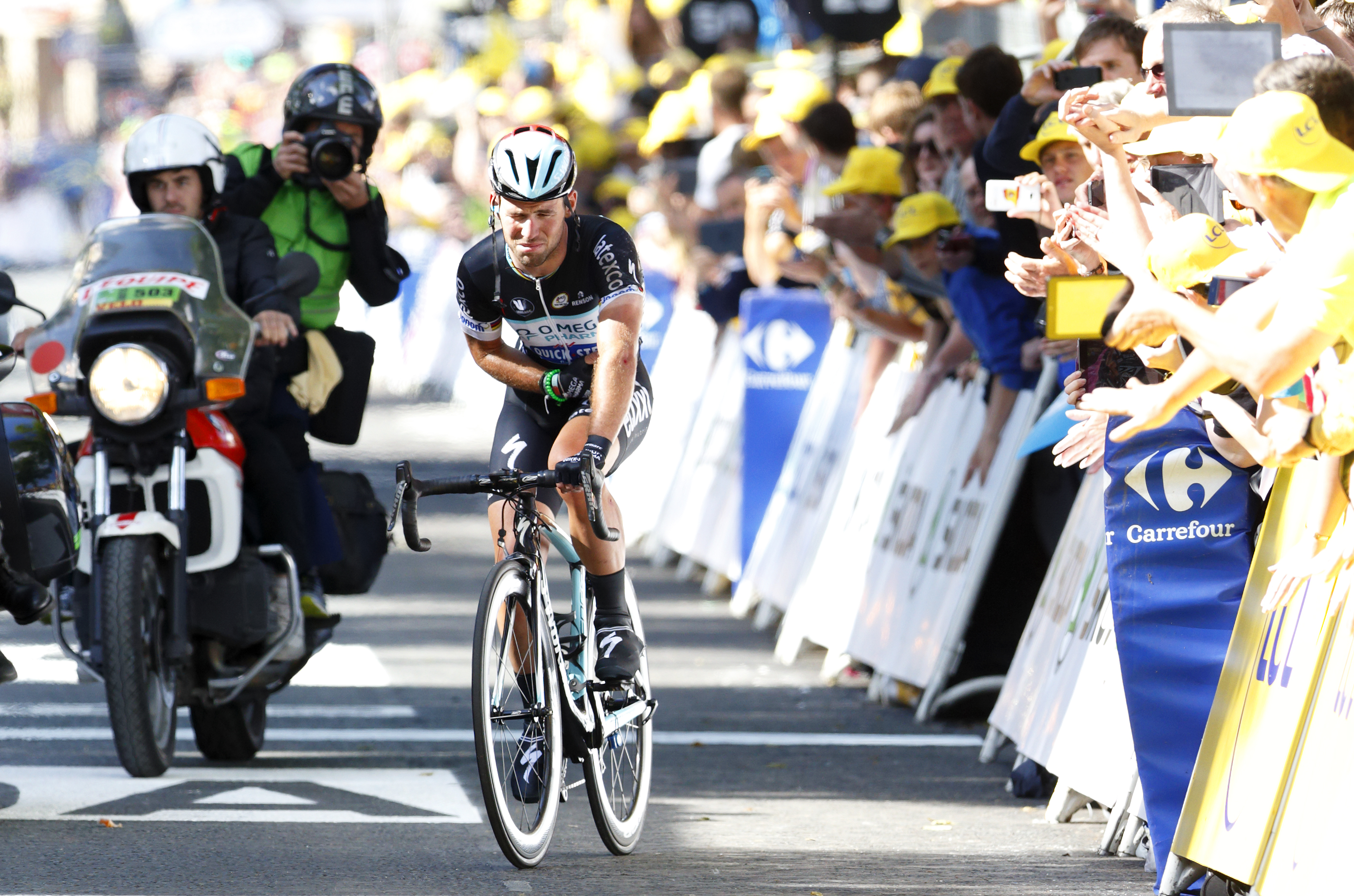
With a Grand Départ hosted in Yorkshire and a sprint finish into Harrogate on stage one, all the stars seemed to be aligning for Mark Cavendish to take the opening yellow jersey of the Tour de France. That was until the Manxman’s hopes came crashing down in the final kilometre.
Cavendish collided with Simon Gerrans and suffered a separated shoulder alongside underlying ligament ruptures that put an end to his Tour before it had even got going.
The Brit explained that he "tried to find a gap that wasn't really there" in a bid to deliver a yellow jersey in front of massive crowds in Yorkshire.
Redemption on Utah Beach
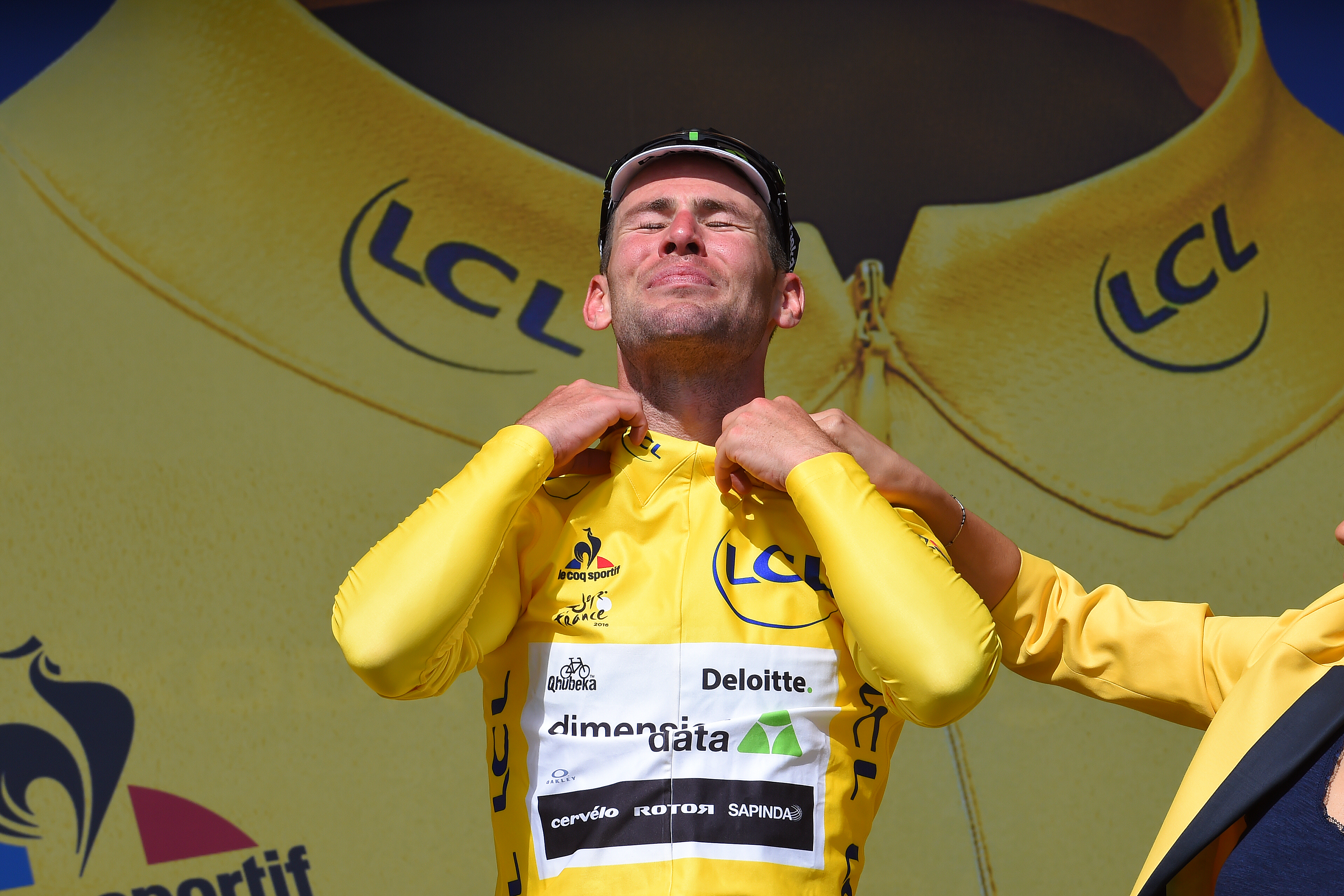
Cavendish had 26 stage wins to his name heading into the 2016 Tour, placing him fourth on the all-time list. Despite all those stage victories though, he was still missing the coveted prize of a yellow jersey.
Most pundits were looking at Andre Greipel or Marcel Kittel to dominate the flat stages given that their lead-outs were unmatched in terms of power, in top form, and that Cavendish himself had not been fully focused on the road due to Olympic preparations.
Nonetheless, it is unwise to disregard Mark Cavendish, and so he proved on the opening stage in Normandy. After leaving Kittel, Peter Sagan and Greipel in his wake to notch up stage number 27.
"It's quite emotional. This is the only jersey in cycling I've not worn. I've had all three points jerseys, the Worlds jerseys and the leader's jerseys in the Giro and the Vuelta and now this. I just wanted to win the stage and to wear this jersey is an honour. I've built my whole career on this race," the Manxman said, reacting to the milestone of his first Tour de France yellow jersey.
Cavendish reached 30 stage wins by the end of the 2016 race, with only Eddy Merckx out ahead of him. Yet, despite reaching this figure in less than a decade, the final five - to break Merckx’s tally - would prove much harder to come by.
Battles off the bike
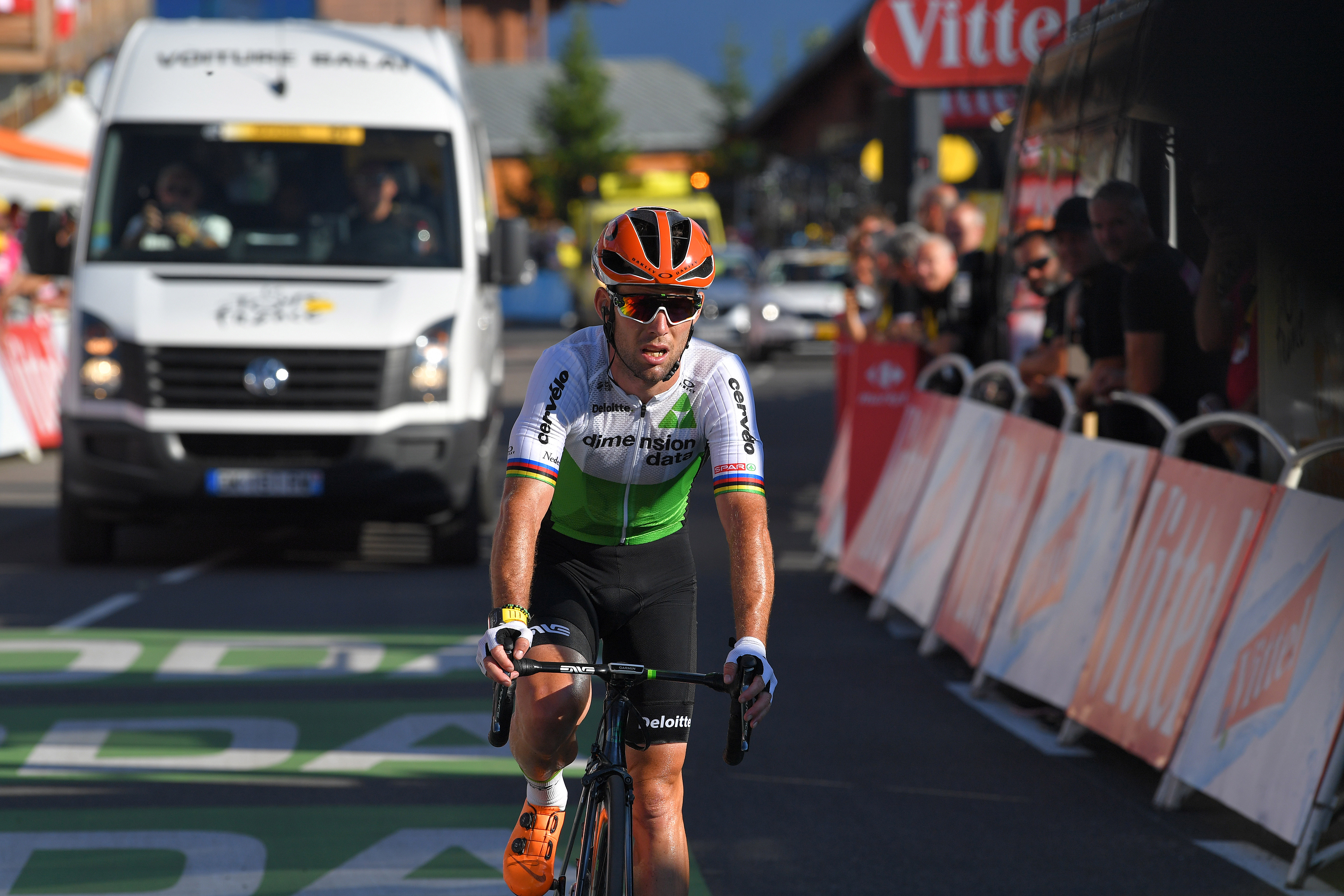
During the next few seasons, Cavendish would be blighted by two bouts of Epstein-Barr Virus. The virus is commonly known as Glandular Fever or Mononucleosis and there is no effective specific treatment apart from resting to aid recovery.
The hard times were compiled by a Tour de France-ending crash on stage four of the 2017 edition, a brutal collision with a traffic divider at Milan-San Remo the following Spring, and a missed time cut at a fruitless 2018 Tour de France.
Epstein-Barr returned in August 2018, forcing Cavendish to take a break from racing for the foreseeable future in a bid to recover from the virus.
The British sprinter returned in 2019 with illness hopefully behind him but the wins didn’t arrive. He switched from Team Dimension Data to Bahrain-McLaren for 2020 but the coronavirus pandemic complicated the situation.
In one of his last races of the season with Bahrain, at Gent-Wevelgem, Cavendish emotionally revealed that retirement could well be near, telling Sporza "That’s perhaps the last race of my career now."
Since then, he’s revealed that the physical health issues he battled during these years took a toll on his mental health too, with the sprinter being diagnosed with clinical depression.
"You don't go from being the best in the world to not being even capable," Cavendish recounted in the Netflix documentary Mark Cavendish: Never Enough. "How has it happened? It turned into stress at home. I was a nightmare to live with."
"I didn’t have anything, didn’t want anything, didn’t do anything, didn’t feel anything," he added when discussing his depression.
"You’re just fucking empty, you know. The sense of worthlessness. I’d lost any get-up that I’d ever had, just to be a person, be a dad, to be a friend, a husband."
Back in the Wolfpack
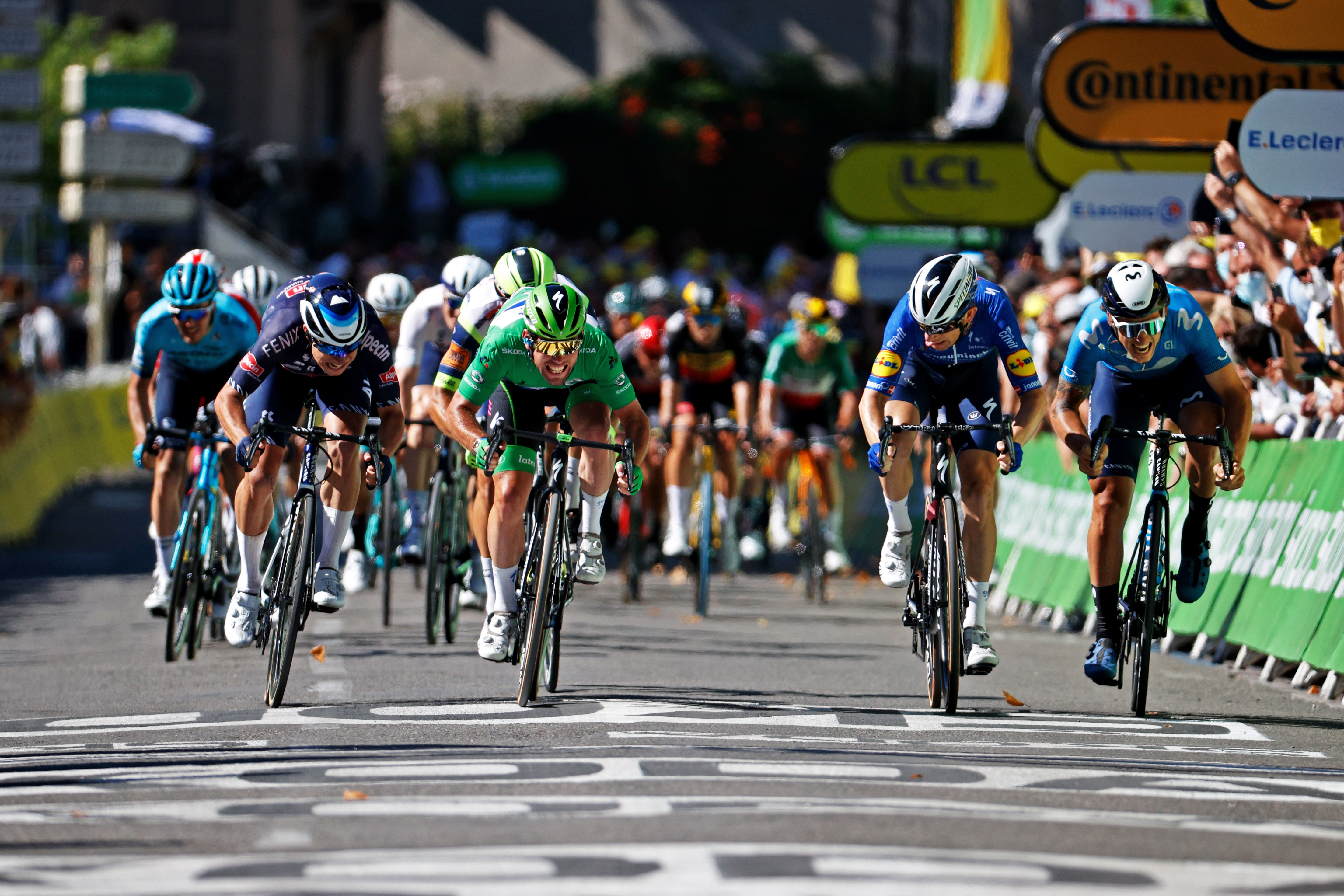
Cavendish was handed a lifeline in 2021 when he re-joined Deceuninck-QuickStep, having previously raced with Patrick Lefevere’s team from 2013 to 2015.
“I have never hidden my affection for my time with the team and to me, this genuinely feels like I am coming home," he said in a statement released by the team.
QuickStep already had Fabio Jakobsen and Sam Bennett as sprinters within the team, but when the Irishman was forced to pull out of the Tour de France squad, Cavendish - who’d refound winning form for the first time in three years at the Tour of Turkey with four victories - stepped up.
Stage four of the 2021 Tour arrived, and the Manxman Missile turned back time like the last few tough years hadn’t even happened. Winning in Fougères, the scene of his final Tour win during his first stint in the team, gave an air of fate. This feeling only grew stronger when he took victory in Châteauroux two days later, where his Tour de France journey truly began.
Another win came in Valence, to leave Cavendish on the cusp of equalling greatness. Led out by his trusted lead-out Michael Mørkøv, the green jersey powered clear in the final 100m of stage 13 into Carcassonne to secure his 34th career victory at the race and move onto equal terms with Eddy Merckx's all-time stage win record.
The outright record looked there for the taking on the final stage in Paris, yet despite Cavendish knowing the famous boulevard better than most, and winning on it more than any other rider, he found himself boxed in and forced to settle for third. The hunt went on.
Astana offer one last shot at the record
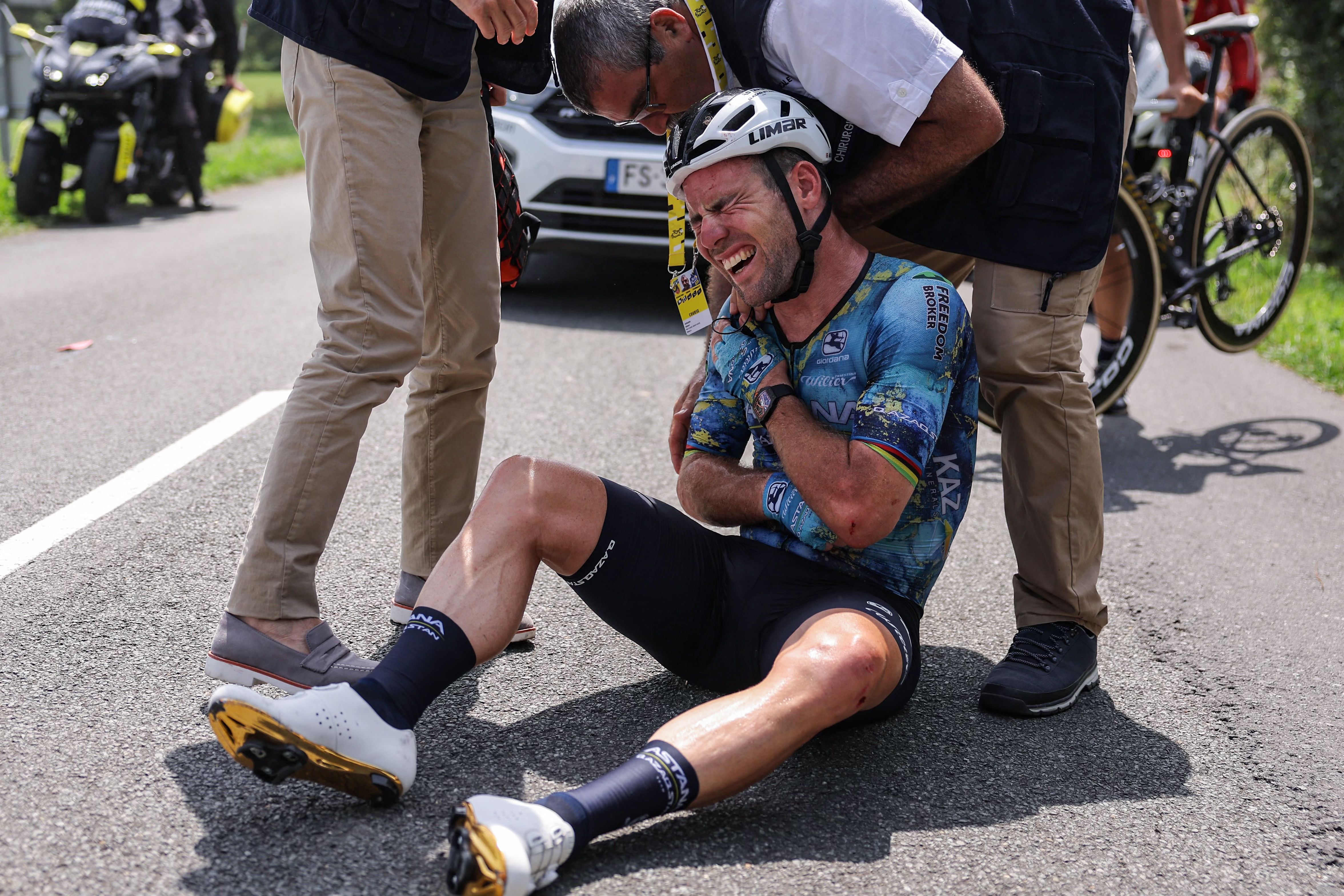
After missing out on selection for the Tour de France in 2022, and with it a shot at the record, the Manxman moved to Astana Qazaqstan in January 2023 in a bid to have a team centred around clinching the illusive 35th stage win.
Cavendish announced on the first rest day of the Giro d'Italia that he’d retire at the end of the season, before taking a fairytale 57th Grand Tour stage win on the final day.
Many were happy to see the sprinter return to the top step of the podium at the sport’s highest level in Rome, with dozens of riders congratulating him, including Geraint Thomas, who helped him with a high-speed lead-out.
Fast forward to the Tour and the Manx Missile threatened during the opening stages of the race. He claimed a second-place finish on stage seven when he was let down by gears jumping on the run for home in Bordeaux, only for disaster to strike the following day.
A somewhat innocuous crash 60km from the finish on stage eight left Cavendish with a broken collarbone, and out of the race. With the reality that it may be his last-ever appearance at the race, a tinge of sadness was cast over the race at the finish.
"I won’t lie, I cried, as did Maurizio Mazzoleni in the team car. Everyone in the team, they’re hurting because there’s a hell of a lot of work gone into this," admitted his former lead-out man and now sprint consultant Mark Renshaw.
Yet, it was almost immediately apparent that team boss Alexandr Vinokurov didn’t want this chapter to end. He offered Cavendish a contract extension, and in October, the Manxman committed to one last year - 'Project 35' was on.
Project 35
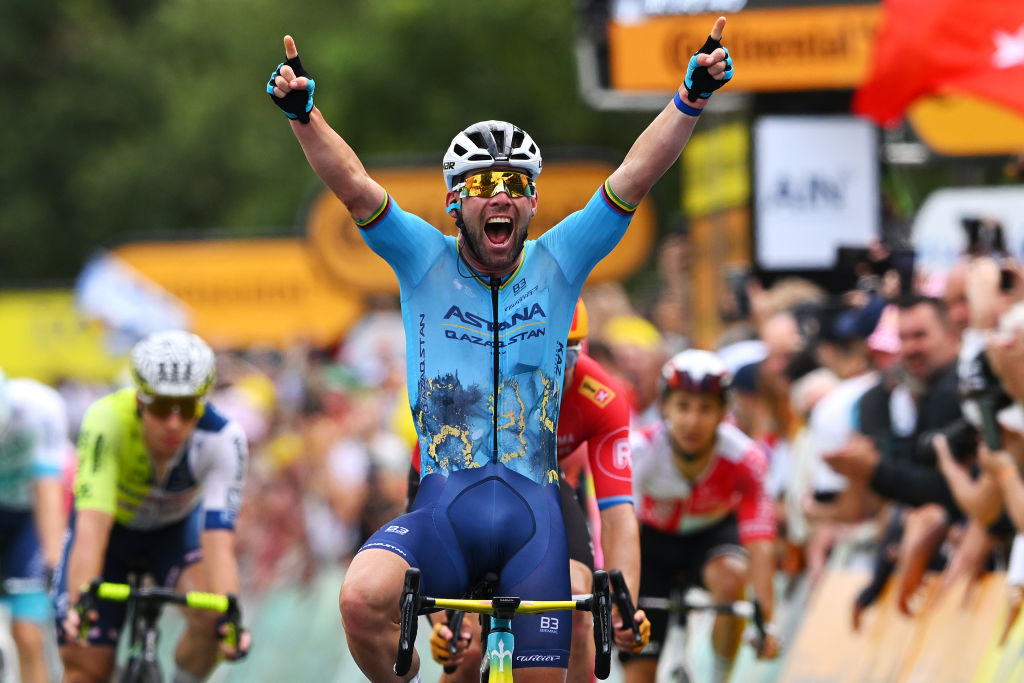
Back for one last shot in 2024, Astana reunited Cavendish with former right-hand man Mørkøv and added Davide Ballerini, also a part of the 2021 QuickStep train, into the sprint train too.
The Tour de France's Grand Départ in Italy wasn’t the ideal way to kickstart his mission for a 35th stage though, with searing temperatures leaving Cavendish distanced and vomiting on the bike.
He battled through though, abandonment by choice wasn’t ever in his contemplation. That perseverance paid off, France arrived, and so too did the cooler weather.
A typically chaotic sprint finale on stage five into the small village of Saint Vulbas unfolded, the Manxman lost Mørkøv’s wheel but he landed in the tracks of Jasper Philipsen. Cavendish hopped wheels again as the metres ticked down, this time onto the rear wheel of Pascal Ackermann, before igniting with 100m and bursting into clean air to win stage number 35.
A length clear of the rest, a stage win more than Merckx. Out on his own as the greatest sprinter in Tour de France history.
As the Manx Missile crossed the line, the emotions began to flow, the size of his achievement perhaps beginning to sink in.
“You see what it means. OK, it doesn’t mean we’re going to be top of the UCI rankings or anything, but the Tour is bigger than cycling, isn’t it?” remarked Cavendish poignantly, all too aware of how the race has shaped his career, and life forever more.

.jpg?w=600)





